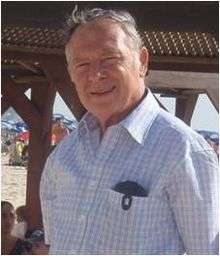Michael Lin (mathematician)
Michael Lin (Hebrew: מיכאל לין) (born June 8, 1942) is an Israeli mathematician, who has published scientific articles in the field of probability concentrating on Markov chains and ergodic theory.[1][2] He serves as professor emeritus at the Department of Mathematics in Ben-Gurion University of the Negev (BGU).[3] Additionally, he is a member of the academic board and serves as the academic coordinator at Achva Academic College.[4] Professor Lin is considered a Zionist, as he gave up a position at Ohio State University in order to promote the field of mathematics in Israel.
Michael Lin | |
|---|---|
 | |
| Born | June 8, 1942 |
| Alma mater | The Hebrew University of Jerusalem, Ohio State University |
| Scientific career | |
| Fields | Mathematics: Ergodic theory; Markov chain |
| Institutions | Ben-Gurion University of the Negev, Achva Academic College |
Biography
Michael Lin was born in Israel. He holds a Bachelor of Science in Mathematics and Physics from The Hebrew University of Jerusalem (1963), Master of Science in Mathematics (1967) and a PhD in Mathematics also from The Hebrew University of Jerusalem (1971). In 1971 he was appointed as an assistant professor in Ohio State University. In 1976 he returned to Israel and became a senior lecturer in the Department of Mathematics at Ben-Gurion University of the Negev. Only 4 years later, at 1979, he became an associate professor and in 1984 he became a full professor. In 2011, Professor Lin retired and nowadays he serves as professor emeritus. During his career at Ben-Gurion University of the Negev he acted as:
- Computer Science Coordinator, Department of Mathematics and Computer Science, BGU.
- Member of BGU Computer Policy committee.
- Chairman and Computer Science Coordinator, Department of Mathematics and Computer Science, BGU.
- Senate representative to Executive Committee of Board of Trustees of BGU.
- Senate representative to the BGU Executive Committee's subcommittee for student affairs.
- President, Israel Mathematical Union.[5][6]
- Head of the Ethical Code Committee of BGU.[7]
In 2004 Professor Lin also acted as a member of the committee electing the recipients of the Israel Prize in mathematics.[8]
In addition to his academic activities, Professor Lin made a social-academic contribution, as he took a part in the 'Kamea Program'.[9] The program helped immigrant scientists to continue working in their profession in the academy in Israel. Professor Lin assisted in the absorption of these immigrants in Ben-Gurion University of the Negev, specifically in the Department of Mathematics. Until his retirement, he was listed as an absorbing researcher of two scientists in his department. He was also responsible for the immigrants’ employment terms and insisted that they will be members of the Academic Staff Union. Additionally, Professor Lin was the university representative in a discussion regarding this program in the Israeli Parliament (knesset) and acted as an advisor regarding the newcomers’ academic seniority.[10]
Research and Publications
Professor Lin's published work focuses on two main areas of research in the field of probability: Ergodic theory[11][12] and Markov chain.[13][14] More specifically, he researched in several areas: mean and individual Ergodic theory,[15][16] Central limit theorem[17][17] and functional analysis.[11][18] Professor Lin has received various grants including: Israel Science Foundation (1995–1998) grant, Research Support Fund grant (2001–2002), Milken Families Foundation Chair in Mathematics grant (1989 until retirement).[19][20] Among others, these grants supported his scientific research which has already yielded 85 scientific publications.
References
- "Microsoft academic search Michael Lin". Archived from the original on 2012-11-29. Retrieved 2012-06-07.
- "Probability Theory and Related Areas Research Group". Math.bgu.ac.il. Retrieved 2012-06-24.
- "BGU Math Emeritus Faculty". Math.bgu.ac.il. Archived from the original on 2008-10-06. Retrieved 2012-06-24.
- Achva Academic College - academic coordinators Archived 2012-11-12 at the Wayback Machine
- "Israel Mathematical Union". Imu.org.il. Retrieved 2012-06-24.
- "הישגים נאים לנבחרת המתמטיקה הישראלית בתחרות בינלאומית באתונה | הידען". Hayadan.org.il. Retrieved 2012-06-24.
- members of BGU committees
- PrasMatmatika.htm
- http://www.math.bgu.ac.il/~camea/freespace/mada2009-09-10-01.pdf
- "מצב תוכנית קליטת מדענים עולים". Portal.knesset.gov.il. 2006-12-19. Archived from the original on 2012-12-18. Retrieved 2012-06-24.
- Y. Derriennic and M. Lin, On Invariant Measures and Ergodic Theorems for Positive Operators, Journal of Functional Analysis 13 (1973), 252–267.
- M. Lin and M. Weber, Weighted Ergodic Theorems and Strong Laws of Large Numbers, Ergodic Th. And Dynamical Sys. 27 (2007), 511–543.
- M. Lin, Conservative Markov Processes on a Topological Space, Israel J. of Math. 8 (1970), 165–186.
- Y. Derriennic and M. Lin, Variance Bounding Markov Chains, L2 – Uniform Mean Ergodicity and the CLT. Stoch. Dyn. 11 (2011), no. 1, 81–94.
- D. çömez, M. Lin and J. Olsen, Weighted Ergodic Theorems for Mean Ergodic L1 Contractions, Trans. Amer. Math. Soc. 350 (1998), 101–117.
- G. Cohen and M. Lin, The One-Sided Ergodic Hilbert Transform of Normal Contractions, in Characteristic Functions, Scattering Functions and Transfer Functions, Oper. Theory Adv. Appl. 197, Birkhäuser Verlag, Basel (2010), 77–98
- Y. Derriennic and M. Lin, The Central Limit Theorem for Random Walks on Orbits of Probability Preserving Transformations, Contemporary Math. 444 (2007), 31–51.
- Lee Jones and M. Lin, Unimodular Eigenvalues and Weak Mixing, J. Functional Analysis 35 (1980), 42–48.
- http://in.bgu.ac.il/President%20Report/PR_2009.pdf
- http://in.bgu.ac.il/President%20Report/PR_2010.pdf